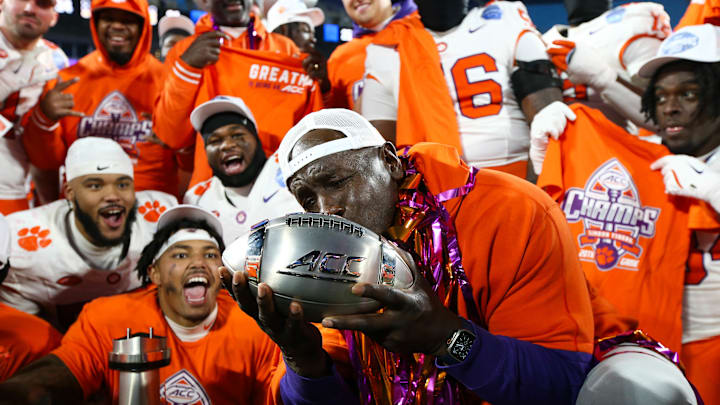The ACC has found itself in a tough spot when it comes to staying competitive in the ever-evolving landscape of college football.
With the SEC and Big Ten dominating the conversation—both in terms of on-field success and financial backing—the ACC has been left scrambling to keep up. If things don’t change soon, the conference could fall even further behind, making it harder to attract top-tier talent and national attention.
It’s time for the ACC to get innovative. Sitting back and hoping things will balance out isn’t going to cut it anymore. The conference needs to start thinking outside the box and making bold moves to secure its place at the table with college football’s biggest powerhouses. Here are five things the ACC must do to stay relevant.
5 things the ACC can do to stay relevant in college football
1. Get Notre Dame into the league as a full-time member
This is the big one. If the ACC can somehow convince Notre Dame to finally join as a full-time football member, it would be a game-changer. Notre Dame brings instant credibility, a massive national following, and a lucrative media deal that could help the conference negotiate better terms in the future.
Additionally, having the Fighting Irish in the fold could help soothe some of the current issues within the ACC—especially with Clemson and Florida State, who are currently in a legal battle with the conference. Getting Notre Dame fully committed could stabilize things and provide a much-needed boost.
Why would Notre Dame join the ACC? Well, the Fighting Irish could have their pick of scheduling and it would give them even more cushion for a playoff berth, all the while allowing them to keep their deals with NBC and Peacock in place.
2. Unequal revenue share
Let’s face it—Clemson has carried the ACC in football for years with a little assist from Florida State every now and then, and if Notre Dame joins full-time, they’d do the same. The conference needs to embrace an unequal revenue share model to keep its top programs happy.
Programs that bring in the most eyeballs and revenue should be rewarded accordingly. The reality is that without these schools, the ACC’s value would take a significant hit. Giving them their fair share is a necessary step to avoid further discontent and potential departures.
3. Find a better secondary partner than The CW
Right now, the ACC has a secondary broadcast deal with The CW, which, let’s be honest, isn’t exactly the kind of partnership that screams “major college football.” Instead of settling, the conference should aim higher by targeting streaming giants like Netflix or Amazon Prime Video.
These companies have been eyeing live sports content as a way to expand their reach, and the ACC could benefit tremendously by being one of the first conferences to partner with them. A high-profile streaming deal could help bridge the gap between their current television contract and the massive deals the SEC and Big Ten have secured.
4. Get creative with private equity
The Big 12 is already exploring private equity options to inject new revenue into the conference, and the ACC should follow suit.
While it might not be the primary source of income, bringing in private investors could provide a much-needed financial cushion to help fund initiatives and even create more competitive incentives for member schools. The key is to be smart about it—leveraging outside investment while maintaining control of the conference’s long-term vision.
5. Actually win some games
At the end of the day, no amount of strategic maneuvering will matter if the ACC can’t start proving itself on the field. The conference has developed a frustrating reputation for losing key non-conference matchups and falling short when it matters most, especially the last couple of years without Clemson at the top of the mountain.
If the ACC wants to stay in the national conversation, its teams need to step up and deliver. You've got brands that people want to watch, even outside of Clemson, Florida State, and Notre Dame. Miami, Virginia Tech, Georgia Tech, SMU, Virginia, and Louisville have all been legitimate programs before, but none of them have been consistent.
The conference has to find a way to build stronger programs capable of competing—and winning—against the SEC and Big Ten.
